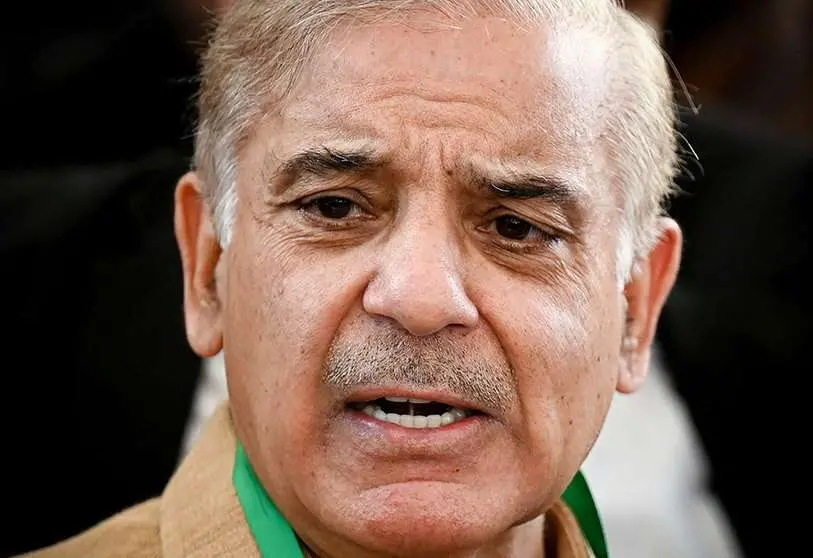Shehbaz Sharif is sworn in as Pakistan's prime minister, replacing Imran Khan

Pakistan has a new prime minister. The opposition leader of the Muslim League, Shehbaz Sharif, heir to one of the country's great political families, will replace the former head of government, Imran Khan, on Monday, after the popular former cricketer was removed from power via a no-confidence motion in a bizarre parliamentary session in which 174 of the 342 MPs voted in favour of his dismissal.
The Supreme Court of Pakistan, the country's highest court, called Khan's ploy eight days ago, when the no-confidence motion was scheduled to be held, "unconstitutional". Cornered by his opponents, the former prime minister dissolved parliament minutes earlier in collusion with the speaker, a close political ally, and called for early elections during a television appearance in which he also used the occasion to launch his candidacy.
Khan was aware that the opposition, united as a bloc with the backing of the United National Movement, a centre-left party of just seven MPs that formed part of the coalition government, had enough support to push through the no-confidence motion and thus put an end to his four years at the helm. In desperation, Khan opted to galvanise his supporters by putting forward the theory that the political operation was a CIA plot.

Finally held on Monday in an adverse climate for Khan, the parliamentary session sought to close the appointment of a new prime minister to take the reins of the Asian nation, a nuclear power of 220 million inhabitants that finds itself in a delicate context, marked by high double-digit inflation and the pressing political division installed in Islamabad.
Shehbaz Sharif's name was in all the pools to take over from Imran Khan, and so it was. The number one of the Pakistan Muslim League (PML-N), the main opposition party, will form a coalition government with the Pakistan People's Party (PPP) of Bilawal Bhutto Zardari, heir to the other great Pakistani political dynasty as the son of former Prime Minister Benazir Bhutto, the first woman head of government in a Muslim country.
Jamiat Ulema-e-Islam's Islamist Deobandi formation, with 15 seats, and the aforementioned United National Movement, which was decisive in passing the motion after abandoning the government with its seven seats in the lower house, will also form part of the new coalition executive, which has a deadline. Sharif's cabinet will remain in place until mid-2023, when the next general election is scheduled to take place.

The new government has gone ahead despite a boycott by Imran Khan's hitherto prime ministerial party, the Justice Movement in Pakistan (TPI), which described the new coalition as "unholy". Parliament saw the largest party in the House, with 155 MPs, resign en masse and walk out of the assembly in the face of what they denounced as the success of a foreign conspiracy. All this just minutes before the vote.
The IPT members left their seats after listening to a lengthy speech by former foreign minister Shah Mehmood Qureshi, who expressed his party's majority view: "We will not legitimise a government brought in by foreign intervention. We are boycotting and announcing our resignation from the National Assembly". The former head of Pakistan's diplomatic service has also withdrawn his candidacy for prime minister, a priori presented as a last resort to maintain power. The former speaker of the National Assembly, Asad Qaiser, did the same before the vote.
Imran Khan thus becomes the first Pakistani leader to be ousted by a no-confidence motion. An abrupt end for a leader who had hoped to finish his term in office, but who has not completed his mandate on the back of populist rhetoric against the corrupt elites who have ruled Pakistan, promising profound reforms, liberalism and an Islamic welfare state, but without significant progress, with more shadows than lights. Losing the backing of the army, the country's most powerful establishment, was his epitaph. Khan does not seem to have lost his ambition for power, though.

A native of Lahore, like Khan himself, Shehbaz was born in 1951 into a family of industrialists. He soon took his first steps in administration as president of the Chamber of Commerce and Industry in the Punjab capital, from where he moved into politics alongside his brother Nawaz, who was a little more experienced in the game. In fact, the latter served as prime minister on three separate occasions: from 1990 to 1993, from 1997 to 1999 and, most recently, from 2013 to 2017.
Nawaz, whose second term was dissolved by an uprising in 1998, left office and went into exile in 2018 after being disqualified following a corruption conviction. Shehbaz was the first in the Muslim League party's line of succession after decades in his brother's shadow and having been elected to the Punjab Provincial Assembly three times, as well as head of the provincial government.
Nawaz, then lord and master of Pakistani politics, failed to bring his brother into the multiple cabinets he headed. But he left the country with him after General Pervez Musharraf's coup. Local media insist that their relationship has been the subject of power struggles, mostly involving Maryam Nawaz Sharif, Shehbaz's niece, who is seen as Nawaz's natural heir.

Seen as a solvent leader, who has been hailed in the past for his ability to manage the economy and build infrastructure, Shehbaz Sharif comes to power with high expectations. But his political career has not been without controversy. In 2019, the National Accountability Bureau froze 23 properties belonging to him and his son, Hamza Sharif, on charges of money laundering, for which he was arrested and released on bail seven months later.
Shehbaz has also been criticised for his inaction in the face of terrorist attacks by extremist sectarian groups in Punjab province, such as the Khalistan Liberation Army, the Sikh separatist movement, during his three terms as head of the country's second largest region, and has been accused of ordering extrajudicial killings.








